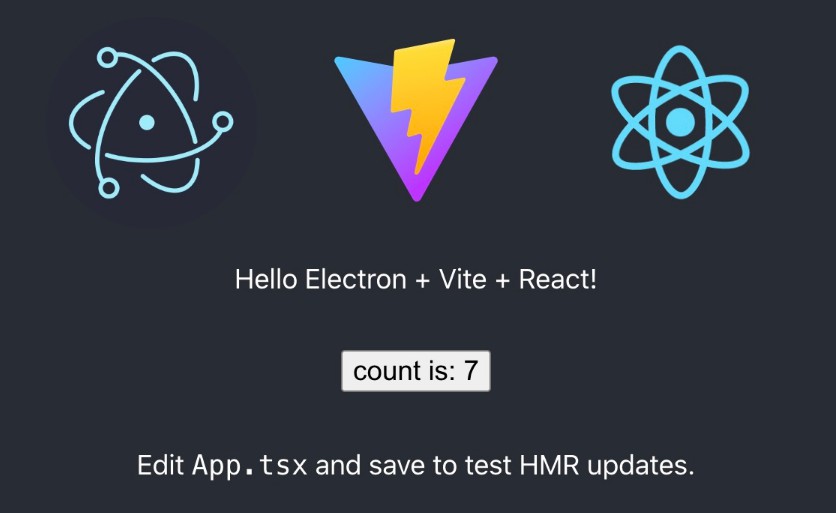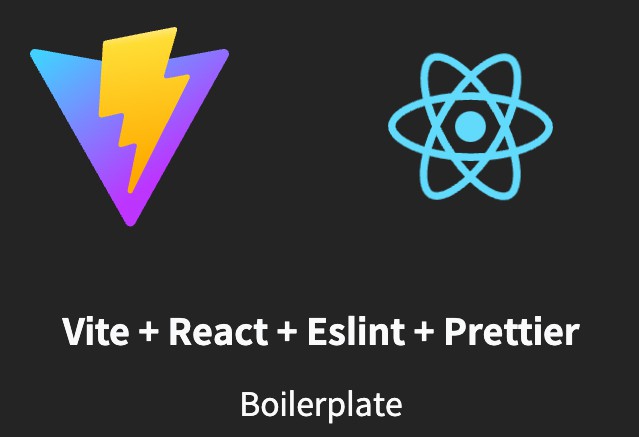vite-solid-electron
Overview
-
Very simple Vite, SolidJS, Electron integration template.
-
Contains only the basic dependencies.
-
The extension is very flexible.
Installation
# clone the project
git clone https://github.com/ch99q/vite-solid-electron.git
# open the project directory
cd vite-solid-electron
# install dependencies
npm install
# start the application
npm run dev
# make a production build
npm run build
Directory structure
Once dev or build npm-script is executed, the dist folder will be generated. It has the same structure as the packages folder, the purpose of this design is to ensure the correct path calculation.
├
├── build Resources for the production build
├ ├── icon.icns Icon for the application on macOS
├ ├── icon.ico Icon for the application
├ ├── installerIcon.ico Icon for the application installer
├ ├── uninstallerIcon.ico Icon for the application uninstaller
├
├── dist Generated after build according to the "packages" directory
├ ├── main
├ ├── preload
├ ├── renderer
├
├── release Generated after production build, contains executables
├ ├── {version}
├ ├── win-unpacked Contains unpacked application executable
├ ├── Setup.exe Installer for the application
├
├── scripts
├ ├── build.mjs Develop script -> npm run build
├ ├── watch.mjs Develop script -> npm run dev
├
├── packages
├ ├── main Main-process source code
├ ├── vite.config.ts
├ ├── preload Preload-script source code
├ ├── vite.config.ts
├ ├── renderer Renderer-process source code
├ ├── vite.config.ts
├
Use Electron and NodeJS API
? By default, Electron doesn’t support the use of API related to Electron and NodeJS in the Renderer process, but someone might need to use it. If so, you can see the template ? electron-vite-boilerplate
Invoke Electron and NodeJS API in Preload-script
-
packages/preload/index.ts
import fs from "fs" import { contextBridge, ipcRenderer } from "electron" // --------- Expose some API to Renderer-process. --------- contextBridge.exposeInMainWorld("fs", fs) contextBridge.exposeInMainWorld("ipcRenderer", ipcRenderer)
-
packages/renderer/src/global.d.ts
// Defined in the window interface Window { fs: typeof import("fs") ipcRenderer: import("electron").IpcRenderer }
-
packages/renderer/src/main.ts
// Use Electron and NodeJS API in the Renderer-process console.log("fs", window.fs) console.log("ipcRenderer", window.ipcRenderer)
Use SerialPort, SQLite3, or other node-native addons in the Main-process
-
First, you need to make sure that the dependencies in the
package.jsonare NOT in the “devDependencies”. Because the project will need them after packaged. -
Main-process, Preload-script are also built with Vite, and they’re built as build.lib. So they just need to configure Rollup.
Click to see more ? packages/main/vite.config.ts
export default {
build: {
// built lib for Main-process, Preload-script
lib: {
entry: "index.ts",
formats: ["cjs"],
fileName: () => "[name].js",
},
rollupOptions: {
// configuration here
external: ["serialport", "sqlite3"],
},
},
}
dependencies vs devDependencies
-
First, you need to know if your dependencies are needed after the application is packaged.
-
Like serialport, sqlite3 they are node-native modules and should be placed in
dependencies. In addition, Vite will not build them, but treat them as external modules. -
Dependencies like Vue and SolidJS, which are pure javascript modules that can be built with Vite, can be placed in
devDependencies. This reduces the size of the application.
Result
Special thanks
Special thanks to caoxiemeihao for almost the entire code base, i just modified a small part to make it work with SolidJS. Original code can be found here










